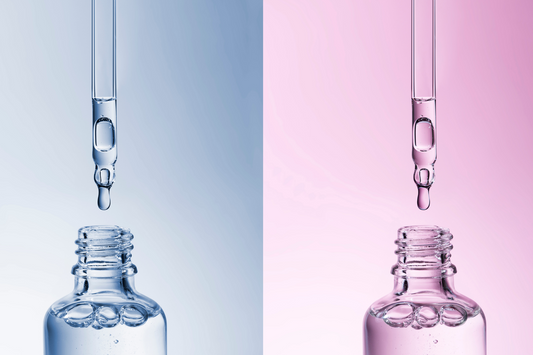If your beard isn’t filling in and you don’t think you’re pulling off the patchy beard look quite as well as Keanu Reeves, then you’ve probably had a quick search to see if there’s anything on the market that will help you grow the kind of facial hair James Harden would be proud of. That search has probably thrown up collagen as a prime beard growth candidate.
Before you start taking collagen pills, it’s worth looking at the research to check whether you’re better off saving your money and trying something different. This article does that check for you, and also looks at other popular beard supplements like biotin as well as some more proven alternatives.
Does collagen help men’s hair growth?
Collagen is a protein - indeed it is the most abundant protein in the body. Collagen makes up connective tissues and is a key component of bone, skin, muscles and tendons. Why, then, is it so commonly linked with hair and, in this case, beard hair? The linking factor is another protein, called keratin. Keratin is a key component of hair, including beard hair.
As proteins, keratin and collagen are both made up of amino acids. The body can break down collagen and use the resulting amino acids to build keratin. This is where the idea behind collagen and beard growth comes from.
This doesn’t however mean that collagen supplementation is necessary or even helpful for beard growth. Collagen can be provided by a normal diet through the consumption of fish and meat. More importantly keratin can be synthesized by the body in other ways - it does not need collagen. The ingredients for keratin synthesis can be obtained from a balanced diet, with a wide variety of common foods containing everything necessary. We’ve covered the role of collagen in hair growth and the hair growth cycle in depth before, for those interested in more detail.
Collagen for beard growth: the research
Research on the impact of collagen on hair is limited - most related studies have focused instead on the effects of collagen supplements for skin and joints. Some of those studies have demonstrated a significant improvement in skin hydration and appearance from a nutraceutical containing collagen peptides. While common sense suggests that looking after the skin that your facial hair grows from is not a bad idea for those wanting a healthy beard, it would be too much of a jump to say this research supports taking collagen supplements for beard growth.
Before relying on marketing assertions about collagen supplementation for beard growth, it’s worth taking note of medical review articles that warn ‘dermatologic claims in the media surpass any evidence currently supported by the literature’.
What does stimulate beard growth?
Taking collagen for beard growth is not an option that finds support in current research, but what does the research say about other popular beard supplements? Another frequently talked about facial hair supplement is biotin.
Can biotin help in beard growth?
Biotin is a vitamin. More specifically, it is vitamin B7. Biotin is sometimes also known as vitamin H - this is because the German words for hair and skin both start with ‘h’. With a nickname like that, it is no great surprise that biotin is commonly marketed as a beard growth supplement.
There is some research to suggest that biotin can improve the structure of keratin, which provides us with a link to hair growth. Something that is more well established is that a biotin deficiency can result in hair loss. Biotin deficiencies are however extremely uncommon in the US, because most people get enough biotin from their diets.
Biotin for beard growth: the research
One recent paper concluded that biotin supplementation may be of benefit to those with inherited or acquired deficiencies and pathologies, but that there is a lack of evidence for supplementation in healthy individuals. Another paper goes even further, concluding that
‘[biotin’s] popularity is vastly disproportionate to the scant clinical evidence supporting its efficacy in hair improvement’. Like collagen then, biotin beard growth supplements do not currently have the research to support some of their marketing claims.
Do beard growth gummies work?
As with seemingly every corner of the wellness industry, there are gummies for sale that purport to provide a simple solution to your problems. Many of these beard growth gummies are heavily reliant on biotin, and in light of the research mentioned above it may be better to save your money for something else. If you have a balanced diet, you will in all likelihood be getting everything your body needs for healthy facial hair growth.
Beard growth supplements: the bottom line
A supplement can almost only ever help your beard growth issue if your issue is caused by a deficiency in the supplemented ingredient. If you don’t have a deficiency, or if your facial hair issue is caused by something else, taking a supplement won’t help.
The best thing you can do for your beard is to eat a healthy, balanced diet. If you have good reason to believe you have a deficiency, it is best to get tested and find out for sure.
Beyond supplements: proven beard growth alternatives
If you’re hoping for better beard growth and you want to take action beyond sorting your diet, your best bet is likely to be a topical option that has proven safe and effective in trials. Unlike collagen, topical products do not need to be metabolized and their direct application means the ingredients are absorbed directly to the follicle. Perhaps most significantly, when compared to supplements, topical products can revive follicles even when the underlying issue is caused by something other than a dietary deficiency.
The beard care industry markets many products that are unsupported by research. To avoid wasting money and emotional investment, it is a much safer move to stick to options that have proved effective in clinical trials.





